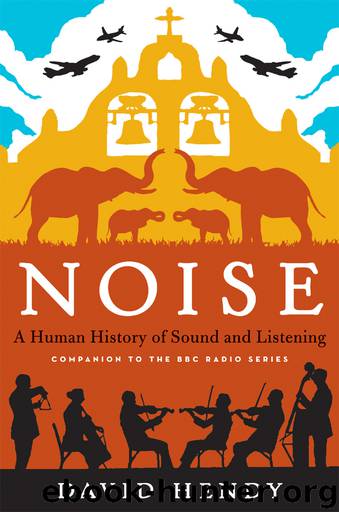Noise : A Human History of Sound and Listening (9780062283092) by Hendy David

Author:Hendy, David
Language: eng
Format: epub
Publisher: HarperCollins
Published: 2013-06-20T16:00:00+00:00
… an old negro near me … trembled, his teeth chattered, and his face, at intervals, was convulsed. He soon began to respond aloud to the sentiments of the preacher …: ‘Oh, yes!’ ‘That’s it, that’s it!’ ‘Yes, yes – glory – yes!’ and similar expressions could be heard from all parts of the house whenever the speaker’s voice was unusually solemn, or his language and manner eloquent or excited. Sometimes the outcries and responses were not confined to ejaculations of this kind, but shouts, and groans, terrific shrieks, and indescribable expressions of ecstasy – of pleasure or agony – and even stamping, jumping, and clapping of hands, were added. The tumult often resembled that of an excited political meeting; and I was surprised to find my own muscles all stretched, as if ready for a struggle – my face glowing, and my feet stamping – having been infected unconsciously, as men often are, with instinctive bodily sympathy with the excitement of the crowd.22
For Olmsted it was all a ‘jumbled cacophony’: his ears weren’t attuned enough to detect the richness of real meaning and the blend of traditions in these sounds. But he recognised, at least, that the call-and-response, the easy mixing of music and speech, the playful language in this African American service offered a more collective, more involving style of worship than was on offer in the buttoned-up white churches back home. This was more than a matter of religion, however: the slave’s style of speaking saturated the whole landscape of the American South, with its distinctive cadences and tones. It gave its speech a pervasive musical quality.23
From the perspective of the twenty-first century it’s not hard to look back and trace a rich through-line of aural history: from the drumming of West Africa and the impromptu concerts of those slaves in Jamaica in 1688, through the noise and confusion of the Stono Rebellion, the fiddle music, hand-clapping, preaching and singing, all the way to the jive, ragtime, blues, jazz, gospel and hip-hop, which have become firmly established as part of mainstream American culture. Indeed, those sounds of Southern slavery have shaped culture globally. They have certainly become part of what Caryl Phillips calls an ‘Atlantic Sound’, linking South Carolina to West Africa via the shipping routes of the Middle Passage.24 For in the bars, cafés and nightclubs, not just of New York or London, but of a coastal city such as Ghana’s capital, Accra – a place closely associated with the old slave trade but also now one of Africa’s most culturally open centres of trade and tourism – it’s easy to be surrounded by rhythms and beats which we think of as essentially American. Walking through its bustling, pulsing heart, we hear that the music has, so to speak, returned home.
Of course, in Accra, just as in America in the eighteenth and nineteenth centuries, music is something that is never static for long. Accra is a cosmopolitan city – of Ghanaians and Nigerians, descendants of the
Download
This site does not store any files on its server. We only index and link to content provided by other sites. Please contact the content providers to delete copyright contents if any and email us, we'll remove relevant links or contents immediately.
The Leavers by Lisa Ko(6461)
Born to Run: by Christopher McDougall(6251)
iGen by Jean M. Twenge(4694)
Sapiens by Yuval Noah Harari(4530)
The Kite Runner by Khaled Hosseini(4416)
Spare by Prince Harry The Duke of Sussex(4188)
Bullshit Jobs by David Graeber(3173)
Livewired by David Eagleman(3115)
Goodbye Paradise(2949)
Never by Ken Follett(2873)
A Dictionary of Sociology by Unknown(2516)
Harry Potter 4 - Harry Potter and The Goblet of Fire by J.K.Rowling(2413)
The Club by A.L. Brooks(2350)
People of the Earth: An Introduction to World Prehistory by Dr. Brian Fagan & Nadia Durrani(2345)
The Social Psychology of Inequality by Unknown(2304)
Machine Learning at Scale with H2O by Gregory Keys | David Whiting(2265)
Harry Potter and the Order of the Phoenix (5) by J.K. Rowling(2224)
0041152001443424520 .pdf by Unknown(2214)
Harry Potter and the Deathly Hallows (7) by J.K. Rowling(2213)
